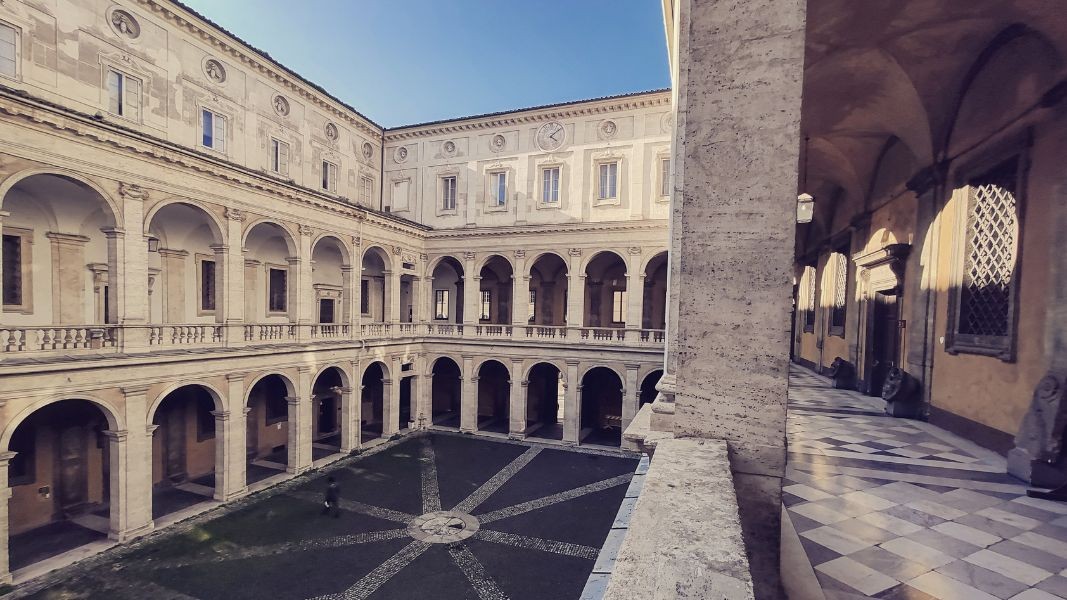"La Sapienza" in Rome is one of the oldest and most prestigious Italian universities, founded in 1303. Today it is the largest university in Europe by the number of full-time students. Similar to other higher education institutions in Italy, the Bulgarian language is taught in it. At the moment, the Bulgarian lectureship belongs to one large department "European, American and intercultural studies", and is in the collegium "South Slavic languages", together with Serbian and Croatian, we learn from Assoc. Prof. Natalia Nyagolova, lecturer in Bulgarian and culture at La Sapienza.
"I had a doctoral student who happened to come across some archaeological excavations near Shumen and she liked Bulgaria so much that she started learning Bulgarian", says Assoc. Prof. Nyagolova. "At the moment I have a student who is a descendant of Bessarabian Bulgarians and that's how she became a member of our group. But as a whole, Italians have a great potential to learn Bulgarian. After all, our language is analytical, as is Italian."

Apart from La Sapienza, Bulgarian language and literature are taught at the universities of Naples, Venice, Bologna, Bari, Trieste. The beginning was made already in 1929 by the Italian Slavist and Bulgarian studies scholar Enrico Damiani, who created the department of Slavic literature at La Sapienza and in 1942 he also founded the department of Bulgarian language at the University of Naples. Enrico Damiani was the scholar who laid the foundations of the Italian department at Sofia University in 1942. Scholars such as Riccardo Piccio (1923-2011), as well as prominent contemporary Italian Slavists Sante Graciotti, Giuseppe Dell'Agata, Mario Capaldo, Marcello Gardzaniti, contributed to the popularization of the Bulgarian language and culture in Italy.
"Italians have a very strong Paleo-Slavic school. But this thing has died out, although there are still these connections, these specialists, but it cannot be said that there is a mass interest in Paleo-Slavic studies among young people here", says Assoc. Prof. Nyagolova. "On the other hand, unfortunately, many students do not have information about Bulgaria, about our culture and our language. Because the Bulgarian language is specific in the Slavic family. I think that work should be done in the direction of providing more translations of Bulgarian literature and films in Italy. The Bulgarian Cultural Institute in Rome is doing a lot in this regard, the Bulgarian colleagues in Italy are doing the same, but it is not enough. Perhaps more ways should be devised for Bulgarian literature to reach the Italians, and not only the modern one. We have white spots around our classical literature, as well as outdated translations that need to be updated. This is a very important channel through which our culture can be popularized in Italy," concludes Assoc. Prof. Nyagolova.

Video: Veneta Nikolova
Photos: Veneta Nikolova, Elena Karkalanova
After the success of the "We are the children of the river" festival in September, a civic foundation is once again collaborating with the Plovdiv City Centre Municipality. This time they have organised an exhibition of the same name, featuring..
The Gala Concert of the National Ballet of El Salvador will take place today at 16.00 in the State Opera House in Stara Zagora as part of the programme of the 54th International Festival of Opera and Ballet Arts . The founder and director of..
The ninth edition of the initiative Poetry in the Metro opens today and lasts until 23 December. The project was initiated by the Polish Cultural Institute in Sofia. It includes poems by 20 European writers. They will be displayed on panels..
The Gala Concert of the National Ballet of El Salvador will take place today at 16.00 in the State Opera House in Stara Zagora as part of the..
After the success of the "We are the children of the river" festival in September, a civic foundation is once again collaborating with the Plovdiv..

+359 2 9336 661
